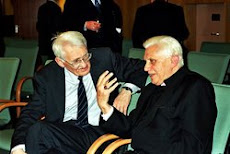Abstract As a result of a new understanding of the relation between theory and practice, the “New Frankfurt School,” with Jürgen Habermas as its major representative, highly values the philosophical tradition of American pragmatism, in contrast to the first generation Critical Theorists represented by Max Horkheimer. In Habermas, the idea of “critique” is, both substantially and methodologically, closely connected with the idea of “praxis” in the following senses: communicative action, rational argumentation, public discussion and political culture. “Critique” is thus found to be immanent in “praxis”; or, a la Horkheimer, pragmatism turns out to be a “critical philosophical analysis” without “falling back upon objective reason and mythology.”
from here
Tuesday, August 29, 2006
Wednesday, August 16, 2006
On Dialogue
"Under a rather humble title Dmitri Nikulin offers in this book a substantial account of what dialogue is and involves. He offers a detailed description and discussion of the different mechanisms of dialogue, its categories and constituents, as well as a useful and instructive review of the different uses of dialogue from Plato to more contemporary authors. At the same time he makes a striking ontological claim regarding the role and function of dialogue, arguing that to be means to be in dialogue.
This ontological claim is a generalization of the views of Bakhtin on literature. Bakhtin was among the first to bring to the fore the dialogicity of what appeared to be monological discourse. In his studies of Rabelais and Dostoevsky Bakhtin showed how novels are polyphonic, how a voice is permeated by other voices at the very moment it claims to be its own. He dedicated several works to the logic particular to dialogue and came to see dialogue as a literary genre. Nikulin wants to extend this view of dialogue and polyphony beyond the boundaries of literature and generalize the inner workings of a text to being: being is, for Nikulin, dialogical. Most of the book is devoted to building and defending this ontological claim that dialogue is the conditio humana."
Continue reading
This ontological claim is a generalization of the views of Bakhtin on literature. Bakhtin was among the first to bring to the fore the dialogicity of what appeared to be monological discourse. In his studies of Rabelais and Dostoevsky Bakhtin showed how novels are polyphonic, how a voice is permeated by other voices at the very moment it claims to be its own. He dedicated several works to the logic particular to dialogue and came to see dialogue as a literary genre. Nikulin wants to extend this view of dialogue and polyphony beyond the boundaries of literature and generalize the inner workings of a text to being: being is, for Nikulin, dialogical. Most of the book is devoted to building and defending this ontological claim that dialogue is the conditio humana."
Continue reading
Subscribe to:
Posts (Atom)




